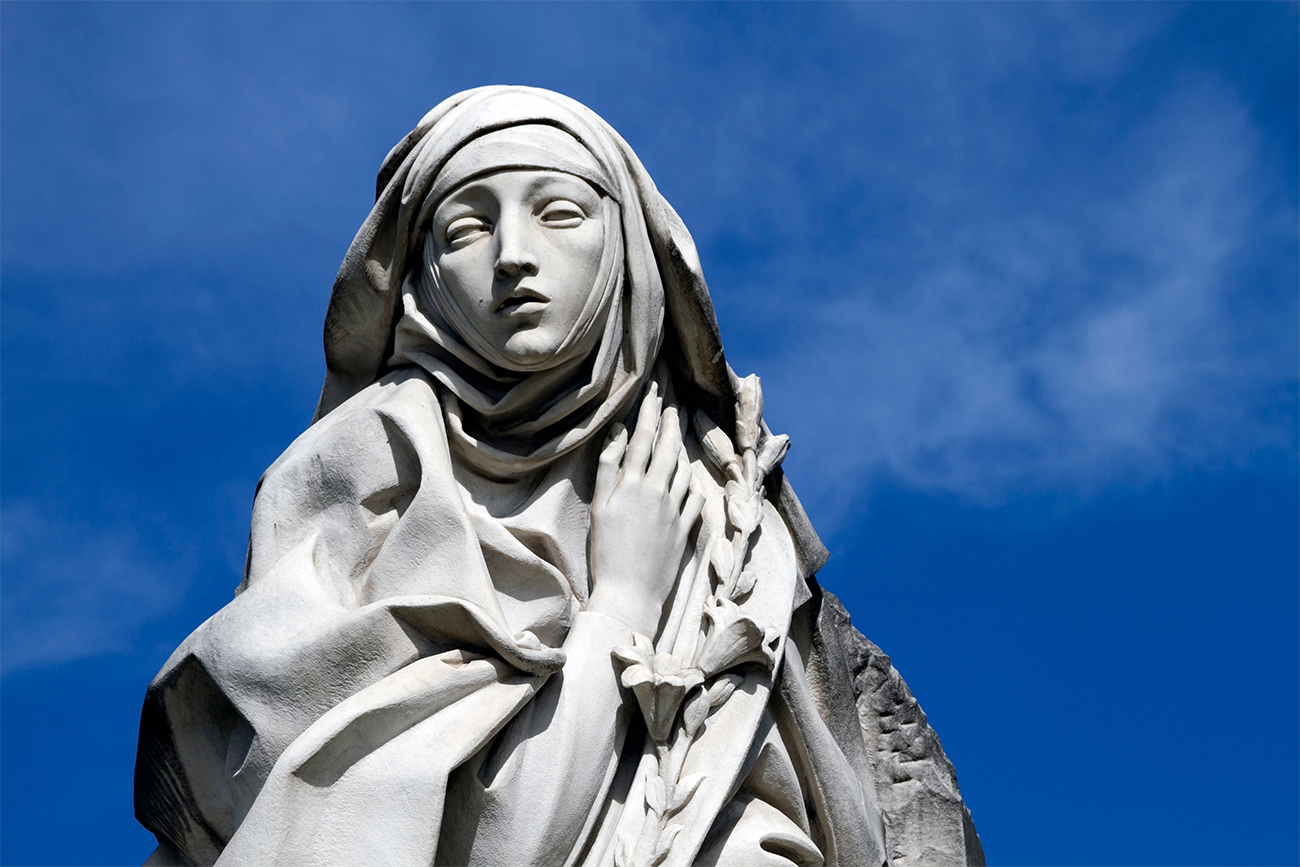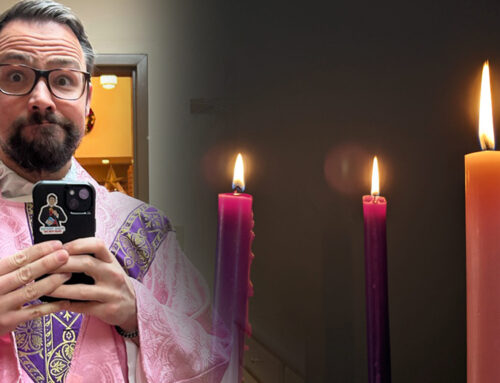St. Catherine of Siena once described a conversation she had with the Lord in prayer, where Jesus spoke the following words to her:
“I am He who is, and you are she who is not.”
Now when we hear these words today, we might be tempted to think:
Wow, Jesus — That sounds a bit harsh! Don’t you care about my self-esteem, Lord? What do you mean by “I am “not?” That I’m not holy enough? Not successful enough? Not productive enough? Not what enough, Lord? What do you mean by “I am not.”
But that’s not what Jesus meant. And we know that because when St. Catherine first heard these words — “I am He who is, and you are she who is not” — she did not feel the least bit offended, disappointed, or belittled. No — quite the opposite!
She found joy and freedom in those words:
She could say from the bottom of her heart: “Yes God, You are He who is — and I am she who is not.”
So on this Gaudete Sunday, when the Church encourages us all to “REJOICE!” — I think we ought to REJOICE in that wonderful and seemingly paradoxical truth: That we are small, and yet so important. That we are very nearly nothing, and yet God sent a Savior for us. That our life is not about us. That we are in fact… not. We depend utterly on God, and our identity is based completely in Him.
St. John the Baptist is a fantastic role model for this humble “I am not” mentality. In today’s gospel passage, the priests and the Levites come to the Baptist in order to ask him a bunch of questions. They ask him first: “Are you the Christ?”
His response is blunt and impossible to misinterpret: “I am not the Christ.”
So they shoot back another question: “So then…are you Elijah?”
Again John replies: “I am not.”
They ask once again: “Are you, then, the prophet?”
John says once more: “Nope. I am not…”
You can almost catch in John’s blunt and forceful replies a deep joy that he is none of these things. There’s no shred of regret — no hint that he would prefer to be the Christ. He’s perfectly content to be exactly who he is. He’s happy to be very nearly nothing… He joyfully proclaims: “I am not the light that you are looking for.”
This is what I love about St. John the Baptist: He doesn’t pretend to be anything more than what he actually is. He does not exaggerate, distort, or stretch the truth. He trusts God enough to be the person he was created to be. And from that place of security in his identity, John the Baptist finds the strength and the freedom over and over again to say: “I am not.”
We struggle with this, don’t we? We feel kind of threatened by how comfortable John the Baptist is with saying: “No, I’m not.”
Very often, we feel pressure to prove ourselves and defend ourselves. We feel pressure to BE everything to everyone — We feel like we need to live up to EVERYONE’S expectations… as if we need to convince the entire world that we are worth something…that we have something to offer. And so we keep saying over and over and over again in all sorts of different ways: “I am, I am, I am. I am this. I am that.”
We can spend our whole lives doing this sort of thing — chasing after affirmation and acceptance. But really, this desperate self-assertion is the essence of pride — the first sin. It’s the cause of Lucifer’s downfall.
For all eternity, Satan and all the other self-absorbed demons echo that same proud mantra, trying so hard to justify themselves: “I am.”
This is why we each need to beg the Lord for an increase in the virtue of humility.
Humility is a very misunderstood virtue today.
When we think about being “humble,” we can sometimes believe that it involves putting ourselves down… belittling ourselves. Never allowing anyone to compliment us. Never accepting praise or recognition…
CS Lewis masterfully flips that lie from the Devil on its head when he says: “Humility is not about thinking less of ourselves, but thinking about ourselves less!”
That’s a much different vision of humility, isn’t it?
One of my favorite books, “Divine Intimacy,” (A great daily devotional for the whole liturgical year) describes humility in this way:
“Christian humility does not lower — it elevates. It does not cast down, but gives courage, for the more it reveals to the soul its nothingness…(it’s not-ness) the more it moves [the soul] toward God with confidence and with abandonment.”
THIS is the key! When we finally recognize our NOTHINGNESS… when we rejoice in the fact that God is He who is, and I am he who is not… then we discover how much we are loved by the Lord.
Yes, we are barely specks of dust in the cosmos. Yes, we are tiny almost beyond comprehension… and yet the God of the Universe knows and counts every hair on our heads. He knows the unique intricacies of our fingerprints… of our DNA… He hand-crafted our every cell.
YES, YOU ARE NOTHING… AND YET, YOU MATTER TO GOD. YOU ARE LOVED with an unconditional, “NO-MATTER-WHAT” divine love.
When we see all this through the eyes of faith, THEN we can finally feel safe and secure enough to rejoice in being nothing. We can rejoice that we are NOT God. Because God is so good. So perfect. So holy.
I can’t help but be reminded here of Gandalf’s final interaction with Bilbo at the very end of The Hobbit… “You are a very fine person, Mr. Baggins; and I am very fond of you,” he says, “but you are only quite a little fellow in a wide world after all.”
And what is Bilbo’s response? Is he offended that Gandalf said he was small? Is his self-esteem wounded?
No! — Bilbo replies… “Thank goodness.”
THAT’S the humility we find in John the Baptist: “THANK GOODNESS I’m NOT the Christ. Thank GOODNESS I’m not Elijah or the prophet…”
He can REJOICE.
Thank goodness.
We find this also so beautifully at work in the Blessed Virgin Mary.
I don’t know if you noticed, but our responsorial psalm today wasn’t actually a psalm. They were the words of Mary taken from the Gospel of Luke — specifically her Magnificat.
This is the song that she sings after visiting her cousin Elizabeth, who as we recall, was pregnant at the time with John the Baptist:
“My soul proclaims the greatness of the Lord, my spirit rejoices in God my savior. For he has looked with favor upon his lowly servant. From this day all generations will call me blessed: the Almighty has done great things for me, and holy is his Name.”
In this beautiful song, Mary is able to say (on the one hand) that she is truly God’s lowly servant — She is only the handmaid of the Lord. She is able to say in all humility, “I am not!” …But then, she is able to say: “From this day, all generations will call me blessed.”
That’s true humility. She’s not showing off. She’s not vying for our attention. She’s just being honest. She really will be called “blessed” for all eternity. She really is the queen of all the angels and saints! — Queen of HEAVEN!
She doesn’t waste any time putting herself down or belittling herself — No, she spends all her effort lifting God up. Pointing to Him! “My soul proclaims the GREATNESS of the Lord.” Thank GOODNESS I’m little. Thank GOODNESS I am not!
That’s the secret to Christian joy. It’s precisely this humble and honest “I am not,” which paves the way for the great I AM of Jesus…
“There is one among you whom you do not recognize,” John says, “one coming after me, whose sandal strap I am not worthy to untie.” One who can say in all humility and truth:
“I am the Good Shepherd.” … “I am the Bread of Life.”
“I am the Resurrection.” … “I am the Way, the Truth and the Life.”
This Jesus of Nazareth is the Son of God — the God of Abraham, and Isaac, and Jacob — the same God who spoke to Moses from the heart of the Burning Bush, saying: “I AM WHO AM.”
God is… and we are not.
In this Holy Eucharist, we come before the Lord Himself — the GREAT I AM. How can we not fall down on our knees in reverent humility and reply with deep joy in our souls: “Lord, I am not. I’m not worthy to receive you. And yet here I am. Heal my soul. …My soul proclaims YOUR greatness.”





Leave A Comment